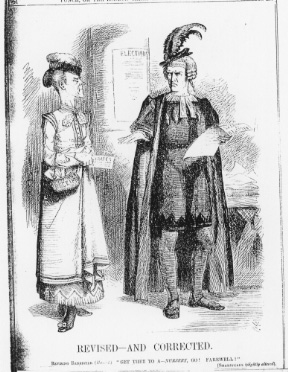
Punch,15 (September 26, 1868):131

 n 1868, Mrs. Lily Maxwell tested the boundaries of female enfranchisement in English law. Mrs. Maxwell was a widow from Manchester who owned a small crockery shop. By chance, her name appeared on the voters' register and she took advantage of the opportunity and voted in a by-election in 1867. When she was discovered and her ballot denied, Mrs. Maxwell took her case to the Court of Common Pleas in 1868. During the age of reform, women were simply not mentioned in the legislation, leading some to believe that women could have the vote. The court ruled against Mrs. Maxwell claiming that 'every woman is personally incapable' of voting. This was a sign to many women that the age of reform would not willingly include them.*
n 1868, Mrs. Lily Maxwell tested the boundaries of female enfranchisement in English law. Mrs. Maxwell was a widow from Manchester who owned a small crockery shop. By chance, her name appeared on the voters' register and she took advantage of the opportunity and voted in a by-election in 1867. When she was discovered and her ballot denied, Mrs. Maxwell took her case to the Court of Common Pleas in 1868. During the age of reform, women were simply not mentioned in the legislation, leading some to believe that women could have the vote. The court ruled against Mrs. Maxwell claiming that 'every woman is personally incapable' of voting. This was a sign to many women that the age of reform would not willingly include them.*
Sir John Tenniel in Revised -- And Corrected depicts the encounter between Mrs. Lily Maxwell and the Revising Barrister, who decided her case. Mrs. Maxwell is far from the idealized women in Du Maurier's drawings. Her decisive gaze is extremely unbecoming. Her clenched mouth, nervous eyes, and ruddy nose do not exude the beauty of a maternal figure. Mrs. Maxwell's facial angle is also narrower than the barrister's, indicating that she is less evolved, and hence less intelligent than the man. Victorian cartoonists often used the ninety degree angle made from the straight line drawn from the ear to the nose and the nose to the forehead as the ideal of human development, and any smaller angle represented less advanced races (i.e., Irish and African). The basket full of receipts represents Maxwell's right to vote as a tax payer. In the accompanying dialogue, Mrs. Maxwell's identity is mockingly changed to Miss. Her demand for the vote is unlady-like and far from the Victorian idea of wife and mother and thus Mrs. Maxwell's title is altered. Although the barrister may look proper, he reveals that he himself lacks honor. He says to Maxwell, "I am a loquacious, reckless, hard-mouthed, and there is nothing I would not do for a Solicitor-Generalship. What do you want in a corrupt atmosphere? We are arrant knaves all. Keep away from us. Go thy ways to a Nursery... ." The acknowledgment that the world of men is indeed tainted, only makes women's demands less founded. The question becomes why virtuous women would want to take part in an adulterated legal system. Women, according to this cartoon, are better in the nursery or in the kitchen where they can remain pure.
Return to Punch page.
Victorian initial "I" by Harlan Wallach ©copyright 1994.]